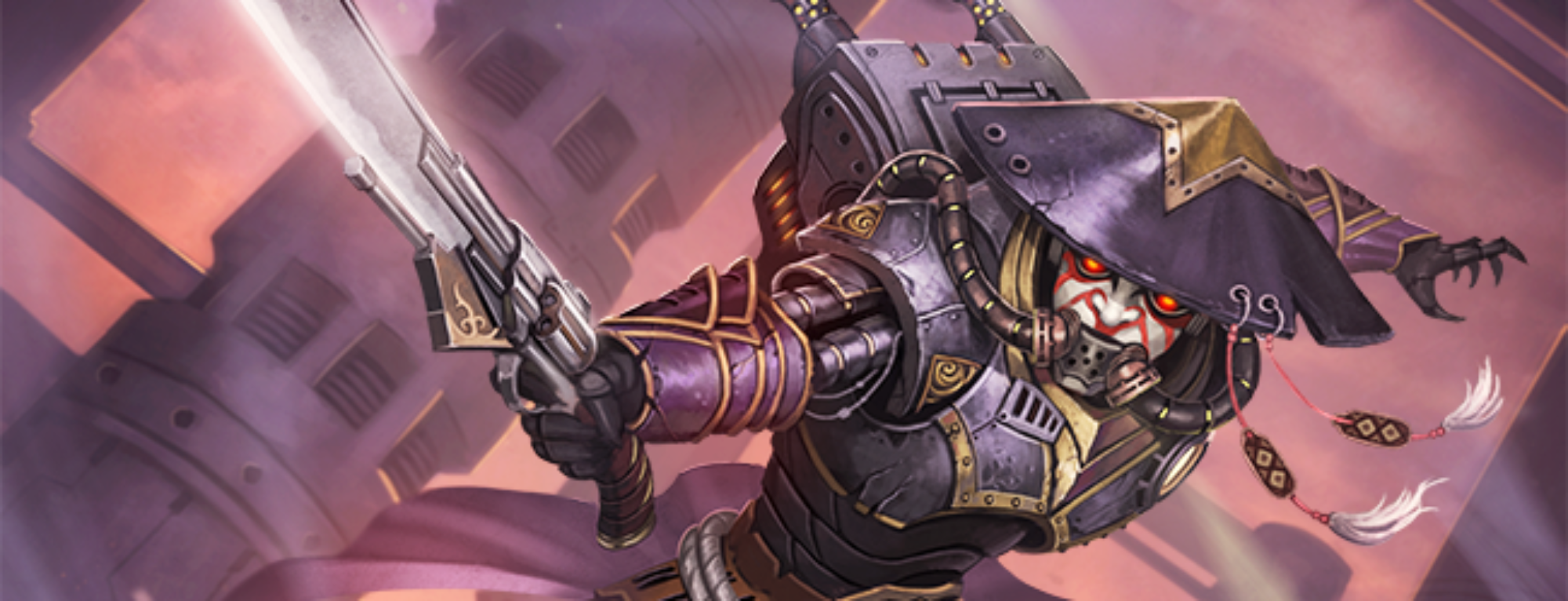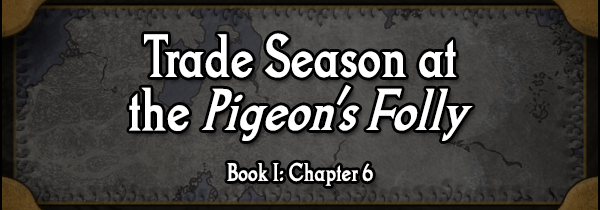The highways took them north quickly. Traffic was brisk as the trade season set in, and there was always a cart or caravan ready to serve a Calibrator Proxy and his associate. Every year the highway grew a bit wider, and the traffic a bit more disorderly, but faster. Some of the carts weren’t even pulled by horses any longer. They had springs in their chassis, wound with cranks.
Ganzorig trusted the horses, and insisted upon using them as often as possible. He had a way with the animals, and from some pouch or pocket he produced a never-ending supply of little treats for them. Whenever he could, he would ride at the front of the cart with the driver, trading stories. Lockhart did the same, but he sat with the traders, the buyers and sellers, the ranchers. It was a long road, and there was a lot of talk.
“Before long we won’t even need to come out here ourselves,” said one of their hosts, a woman of about forty years who shaded her face under a linen umbrella. “We’ll just send our ledgers with a budoka or two and count the profits when they return.”
The idea took Lockhart by surprise, and it must have shown on his face, because the woman smiled at him and wagged her finger.
“You can’t keep them to yourselves forever, you know,” she said. “Sooner or later, the techniques will be known.”
“A budoka isn’t something you send to do an errand,” Lockhart replied. “Their engineering is the work of many years, their construction takes practice. And they can be dangerous.”
“It takes a long time to raise a steer, too,” the woman said, still smiling. “And they can be dangerous. Can you imagine the reaction in Zweigr or Scoria if I told them I was keeping all the steaks under lock and key because the cattle were too much to handle? I’d go out of business.”
“We don’t sell budoka,” said Lockhart.
“Well, I think you ought to.”
Lockhart thought about that for a long time, even as he traded stories and rumors with the other traders. Budoka were not made to sell. They were made to serve, and to exalt their creators by display of mastery. It was near heresy to suggest that they carry ledger books for the cattle traders. Then again, it was against the law for budoka to be trained above their station, not below. But for such an exquisite instrument to be used for such a mundane task… it was a waste.
By and by, they went North, until the highway was long gone, replaced with gravel roads between fences and farmland. They spent their first night at an inn the locals all called “Laura’s,” although the sign read Pigeon’s Folly. Carved into the sign, a wooden pigeon wearing a beer mug as a helmet stared down the road with drink-dazed indifference. Ganzorig’s falcon took wing and landed on the sign, scratching curiously at the hook from which it swung.
“She thirsty,” Ganzorig said. “Maybe want helmet for herself. You tired, streetfoot?”
Conversation in the smoke-filled dining room was momentarily smothered when the strange pair went inside. Those from the southern cities recognized Lockhart’s assembly uniform, and those from the northern territories recognized the beads in Ganzorig’s hair. Their weapons marked them as duelists.
“I smell beef!” Ganzorig bellowed, a broad grin on his face. “Beef stew! Two bowls. My friend pay.”
He clapped Lockhart on the back and a wave of laughter passed over the dining room. The tension was broken, and Lockhart was happy to play the tagalong to the garrulous hillman if it put the room at ease. He followed Ganzorig to a table by the back wall and slumped into a chair. The road was long, and it had been some time since an assignment had taken him so far from the capital.
Before long, their stew arrived. The vegetables around that time of year were as crisp and fresh as ever. All the traffic on this road was going south, and the inn wanted return customers when the stock traders returned to the farms and ranches, so they served all their best.
“We have luck,” Ganzorig said. “More months, winter come. Winter hunting not so nice. And in wild, no kitchens. No beds. Not so nice.”
Lockhart nodded, checking the door and the windows automatically, getting a feel for the room. A few eyes lingered on them, looking them over. Only a few others in the room were armed. Bodyguards for the stock traders and farmers. Among the curious gazes there were a few hostile glares, all from a single table in the opposite corner. Half a dozen rough-looking men and women, their coats stained at the tail as if they had been long on the road.
“I’ve been hunting in winter,” Lockhart said, looking away from the ruffians.
“Really!” Ganzorig replied, wiping the stew from his beard on the back of his arm. “You hunter? What your… quarry? How I say… prey?”
“Quarry is right,” Lockhart replied, reaching out to tug the bearskin hanging from Ganzorig’s shoulder. “Nothing like this, though. I hunt the budoka, like the one we’re after now.”
“Metal men,” Ganzorig nodded. “I see few in hills. Only few. Many in south cities. But none like Thane.”
“It told you its name?” Lockhart asked, taken aback. “I’m surprised. The metal men I hunt can hardly speak at all. Or they say nonsense.”
“Not this one. Thane talk clean. Cleaner than I. Sound like old man from south city. Man you work for… what his name?”
“Master Tetsuo.”
“Thane talk like Master Tetsuo. Sound sometime like song without music. I hope he learn hill speech.”
Lockhart wondered for the first time if Ganzorig understood the task they’d been assigned. But before he could formulate a question, he felt a hand on his shoulder. One of the corner-table ruffians stood over him, smiling. The smile didn’t quite reach his eyes.
“Evening, traveler,” the man said. “I don’t mean to trouble you.”
“No trouble,” Lockhart said, glancing down at the hand still resting on his sleeve. “What’s your name?”
“Call me Barth. Let me ask you a question: are you planning to stay at the inn tonight?”
Lockhart glanced around the room and made a quick count of the others. It was easy to see the pocketbooks and purses belted to their hips. Stock traders from the city travelling out to ranches and farms, most of them carrying cash for auctions. All wore watches, and the ladies’ ears glinted with jewels. Modest though they were, they were still valuable.
“We’ve already made a reservation,” he replied, tapping Ganzorig’s foot with his own to signal the lie. “Why do you ask?”
“Well, it’s just that they’re about full up,” said Barth. “Just one room left. And my fellows and I like to keep two rooms. Men and women travelling together, you know. It can be awkward.”
“Isn’t there anywhere else to stay? This is a busy crossroad.”
Lockhart could feel the man’s impatience through his grip. After a moment, Barth released his shoulder and leaned over the table.
“There’s business we need to attend to here,” Barth said. “And I wondered if there might be any way I could convince the two of you to give up your room here and take another down the road. Maybe at the Bridge’s Bath or some other place. I’d be willing to pay the difference. After all, money’s easy to come by in the trade season. And the Bath’s safer, after all.”
“Safer in what way?”
“Not so many trigger fingers there. Not so many nervous glances.”
Over the course of their talk, the inn had fallen quiet. Murmurs of conversation persisted, but at every table eyes turned to the assembly agent and the highwayman.
“My man,” Lockhart said. “I’m starting to think that you must think I’m some sort of idiot.”
Barth stepped back. His hand flinched as he instinctively reached for his flintlock, but suppressed the reflex.
“That’s a fine way to talk!” he growled.
“You’re speaking to a calibrator proxy on field duty,” Lockhart continued. “Whatever business you think you’re going to attend to here is concluded. Count yourself lucky we arrived when we did. Imagine how differently this conversation might have gone if we’d interrupted you.”
By then, all voices were silent. The faint clatter of work in the kitchen was all that could disturb the tense quiet, and at the corner table, the click of a flintlock hammer was as clear as a bell.
The screech of the golden eagle Zorba cut the air like a claw through skin, and everyone ducked but Ganzorig as the massive bird dropped from the rafters to the corner table, knocking dishes and stew in a crashing mess to the floor. The creature locked eyes with one of the women seated there, whose hand was under her coat. Her face was pale as the eagle cocked its head, displaying the knife-sharp hook of its beak, only inches away.
“She always go for eyes,” Ganzorig said, with a dark laugh. “Bad girl. Want dessert before dinner. I feed olives sometime, but she know difference.”
“Find another line of work,” Lockhart said, having never broken eye contact with Barth. “We’ll be back this way when our work is through. If I hear of anything untoward, I’ll request special dispensation to deal with you myself. I have no doubt the request will be granted.”
The quiet continued, but the tension was broken. The ruffians slunk out one by one, their shoulders slumped, heads down. The door swung shut behind them.
Ganzorig’s chair scraped against the floor as he got to his feet and went to the bar, where he retrieved a broom and dustpan. He took them to the corner table and began to sweep up the pieces of broken pottery and glass from the spilled meal, and as he did so, the eagle hopped with a wingbeat to his shoulder. Laughing, the hillman picked up a strip of beef from the table and fed it to her.
By and by, the quiet melted away. There were trades to make and money to be made. It couldn’t wait forever.

